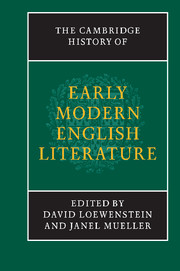Book contents
- Frontmatter
- Introduction
- 1 Modes and means of literary production, circulation and reception
- 2 The Tudor era from the Reformation to Elizabeth I
- 7 Literature and national identity
- 8 Literature and the court
- 9 Literature and the church
- 3 The era of Elizabeth and James VI
- 4 The earlier Stuart era
- 5 The Civil War and Commonwealth era
- Chronological outline of historical events and texts in Britain, 1528–1674, with list of selected manuscripts
- Select bibliography (primary and secondary sources)
- Index
- References
8 - Literature and the court
from 2 - The Tudor era from the Reformation to Elizabeth I
Published online by Cambridge University Press: 28 March 2008
- Frontmatter
- Introduction
- 1 Modes and means of literary production, circulation and reception
- 2 The Tudor era from the Reformation to Elizabeth I
- 7 Literature and national identity
- 8 Literature and the court
- 9 Literature and the church
- 3 The era of Elizabeth and James VI
- 4 The earlier Stuart era
- 5 The Civil War and Commonwealth era
- Chronological outline of historical events and texts in Britain, 1528–1674, with list of selected manuscripts
- Select bibliography (primary and secondary sources)
- Index
- References
Summary
The dynamics of literature in the early Tudor court
In the summer of 1537 Henry Howard, Earl of Surrey, was imprisoned by order of the King. This was the first of four such occasions (from the last, in the Tower, he would not return). ‘The most folish prowde boye that ys in Englande’, the 21-year-old heir to the greatest title outside the royal family, was boxed in. If his punishment was mild – confinement in Windsor Castle, silent without the court’s activity, where walls without tapestries returned ‘a hollow sound of plaint’ – Surrey’s dilemma was not. In his stanzaic poem beginning ‘So crewell prison’, the longer of two texts he wrote to dramatise his situation, Surrey’s speaker is losing his ‘freedom’, a pun ambiguously situated between ‘liberty’ and ‘blood-nobility’. In actual fact, Henry VIII had sequestered his cousin, and the personal humiliation for the stylish aristocrat was worse than the public. Accordingly, in conversation, the courtier George Constantyne answers the attack on Surrey as a ‘prowde’ show-off by responding: ‘What then? he ys wise for all that’ and ‘no mervell though a yonge man so noble a mans sonne and heyre apparante be prowde’. The courtier on the lower rung identifies the very public place Surrey held in the stratified space – physical and cultural – called the court in 1537.
- Type
- Chapter
- Information
- The Cambridge History of Early Modern English Literature , pp. 229 - 256Publisher: Cambridge University PressPrint publication year: 2003
References
- 1
- Cited by



